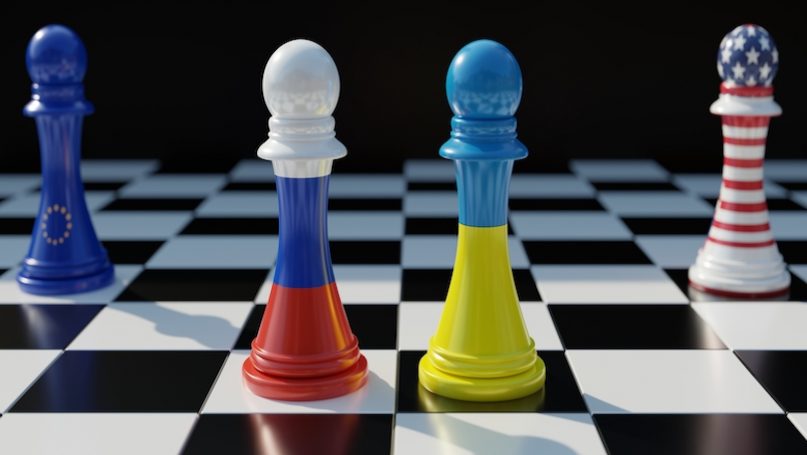
Ukraine’s unexpected battlefield success against Russia’s invasion has put the West on a high. This high has translated to the economic, diplomatic, and indeed the moral sphere, sending Western self-confidence burgeoning. Reputable newspapers report that even India may soon abandon its neutrality because India is a democracy (without attempt to capture public opinion in that democracy) and because Russia is close to China (without mentioning recent Indo-Chinese diplomacy). Neither Russian atrocities nor battlefield results command respect. Yet the West may have the larger credibility problem.
Earlier I argued that while Russia’s invasion of Ukraine is wrong, the Kremlin has a plausible narrative for every reason it has given to invade; a fact that has clouded our view and hampers our ability to persuade. The West has, still, technological, military and economic might. Yet in other dimensions it is getting ahead of itself. For Westerners the comparison with a corrupt and unorganized Russia, down to its previously renowned military, clearly proves Western moral superiority. Others may see things differently. And prioritize their own interests.
Russia may soon default on foreign debt – seemingly momentous. Perspectives differ. Russia has an excellent reputation for debt repayment. Unlike some European states, nobody doubts Russia having the resources and determination to pay. It has money in the bank, the US, which thus owes Russia. This money is not available to its owner upon request: the US are in default.
Boris Johnson wasted no time getting friendly with MBS, the de facto Saudi Arabian leader whom until recently we wanted tried for having a journalist cut to pieces. Unsurprisingly, MBS had his demands listed. Oil payments being shifted from Russia to the Middle East, along with payments for very expensive LNG, sponsoring of salafism and terrorism will increase. Weapons are in ample supply (we have just supplied them), while food shortages and population growth are fertile grounds for mass migration to Europe. Borders are open.
That same Europe now dangles EU membership before Ukraine – in Putin’s words corrupt even to Russian standards. Observing how EU funds are currently dispensed in Hungary, Poland and Romania, what is the perspective here?
Calling Putin’s demand for ruble gas payments blackmail when the West freezes assets in currencies it controls is yet another example of rhetoric overshooting its aim (and driving up prices). If gas supply ends, European industry will be lackluster for years, overtaken left and right by Japanese, Korean, American, Chinese, Indian and, dare I say it, Russian rivals, some of which may tap into cheap Russian gas no longer flowing to Europe.
Morally, then. Even considering a Russian argument is now labeled playing into Putin’s hand: centuries of enlightenment, which we claim to be defending, are in play. Canceling courses on Dostoyevsky and excluding Russian athletes even when competing under a neutral flag fit seamlessly into modern US domestic culture of hyperpolarization and cancellation, now exported to all of the West. It is perhaps in this light that we should view the long journey from the postwar perception that for stability reasons, Austria and Finland better be neutral, to the 21st century hyperliberal conviction that Ukraine, of immeasurably greater historical and strategic importance to Russia, have free agency to join NATO.
While Russia’s leadership has a credibility problem inside Ukraine, on the wider international scene their credentials are better. Obvious propaganda – that the Ukrainians themselves should have bombed Mariupol to rubble – is what it is: propaganda. Perhaps it is not even intended to be believed, like Vasili’s utterances in the opening pages of War and Peace. For all the rest, Russia is clear. The West is fickle.
Europe has failed to prevent war and its sequelae on its own soil, casts unrealistic plans of windmills and energy savings, faces unprecedented impoverishment of the lower socioeconomic classes, and clings to comfort even with supposed principles at stake. It remains dependent on the United States for weapons, guidance, and ideas. The US remain somewhat unscathed in economic and military terms, but their moral outrage of Russian aggression is hardly taken seriously outside of the Western world, given Iraq, Libya, and elsewhere.
While Russia is weakened by this ill-advised and gruesome war, so is the West. Ironically, especially Europe may need the inclusive, multilateral security arrangements that Putin proposed more than ever. Few causes are as worthy as a country’s self-defense, but a global Cold War seems like heavy lifting now.
No comments:
Post a Comment